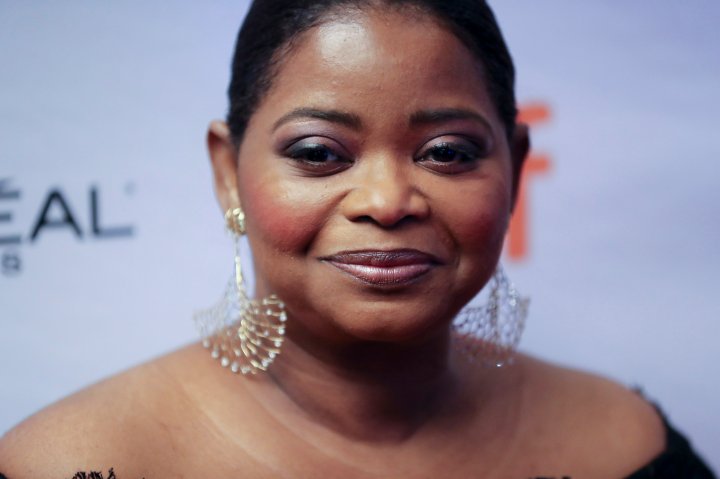There are at least four feats of movie magic in director Guillermo del Toro’s new film The Shape of Water. First, there’s the fact that the lead speaks no lines: Sally Hawkins plays Elisa, a mute woman who works as a cleaning lady at a Cold War–era government laboratory. Second, there’s the monstrous yet alluring sea creature the scientists have captured from the waters of South America, rendered as a towering, scaly brute with human sensitivity. Third, there’s the sexy, wordless romance that develops between Elisa and the creature. And finally, there’s Octavia Spencer, who, as Elisa’s talkative, down-to-earth work friend Zelda, makes it all believable.
Spencer has found success before in 1960s-era roles with performances that bring great dignity to characters who, as black women in that period, were afforded none. She won the 2012 Academy Award for Best Supporting Actress for her performance as the Mississippi maid Minny Jackson in The Help. She was nominated again for her role as NASA programmer Dorothy Vaughan in last year’s Hidden Figures, making her the first black woman to be nominated for a second Oscar after winning one. Both films took place in the ’60s with the civil rights movement under way. Both saw her staring racism and sexism in the face, fighting for fair and humane treatment. But Spencer admits that playing women with little agency, who face struggles that should not but still do exist today, is taxing. “To be in that headspace for the entirety of a film is just not fun,” she says.
Soon she’ll play Madam C.J. Walker, who became the first female self-made millionaire in America in the early 1900s. But the business-woman will be her last historical role for a while, she says, despite the fact that offers keep rolling in. She needs a break from period pieces. “Honey, I don’t have to tell people I’m a black woman,” she says. “I want to be able to just be. To play a woman who happens to be a woman.”
Spencer’s character in The Shape of Water, though living through the same period as Minny Jackson and Dorothy Vaughan, is just that kind of woman. Racial tensions cast a shadow over the story: a black couple is banned from a pie shop, and we catch a flash of protesters being brutalized on a television. And prejudice against perceived “others” is a central theme of the film. But Elisa’s disability, the creature’s unfamiliarity and the strangeness—and beauty—of their relationship are the primary focus.
Zelda’s chief worries are for Elisa’s well-being, their job security and her lazy, unappreciative husband. “She’s empowered,” Spencer says. Del Toro created the role with her in mind, and even though it fits a certain pattern—“I played a maid, then I played a woman at NASA, now I’m playing a maid at NASA,” Spencer joked at a recent screening—the character felt fresh, because she doesn’t have to bear the weight of her historical circumstances.
Hollywood has a long way to go before there are enough powerful roles for women, particularly women of color, to go around, Spencer says, adding, “Guillermo created a role with me in mind—it’s still a cleaning lady.” Which is not to say she’ll never play a maid again: “If it’s a serial-killing maid, of course.”
But in the meantime, Spencer has set her sights on producing, which she sees as a means to create opportunity not only for herself, but also for more performers of different ethnic and racial backgrounds, ages and body types. Hollywood’s obsession with remakes only gets in the way of telling the kind of unique, new stories she thinks people want to see. “Blade Runner [2049] is an indicator of why that shouldn’t be done, with a gigantic price tag—then you look at Girls Trip, Bad Moms, Get Out,” she says—those are the movies she wants to make. Nothing set in the 1940s, 1950s or 1960s, please.
Spencer is producing an HBO limited series on the Jonestown massacre with Vince Gilligan and Michelle MacLaren of Breaking Bad, and producing the C.J. Walker project, another miniseries, with LeBron James’ production company for Netflix.
After that, it’s time for some laughs: “I can’t wait to do some good old-fashioned comedy,” she says. And if her longtime wish comes true, someday she’ll get to make one with her dream collaborator: Jackie Chan. Spencer was in the room when the legendary martial artist received his honorary Oscar last November, but the crowd was too deep for her to approach. She’s never had the chance to meet him. “So this is my way of saying, ‘I love you, Jackie Chan!’” she says. “I just screamed it out from my hotel in New York.”


